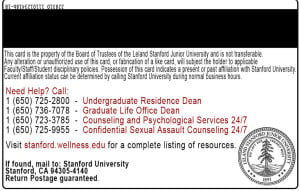
The ASSU Executive Team on Mental Health is pushing new initiatives to combat mental health issues on campus, effective this quarter and next fall.
Among these efforts is an update of current and future SUID cards to include emergency contact information for mental health resources. The back of SUID cards for the Class of 2019 will include phone numbers for the Undergraduate Residence Dean, the Graduate Life Office Dean and the 24/7 phone lines for Counseling and Psychological Services (CAPS) and confidential sexual assault counseling through SARA. Stickers to be placed on current students’ cards will also be distributed this quarter.
According to the co-director of the ASSU Mental Health team, Nikita Desai ’15, access to emergency numbers on ID cards is already in place at peer institutions like Columbia and Brown.
“The ID cards are a basic step that should’ve been taken many years ago,” she said. “One of the reasons it was easy to do is it’s not something that’s very controversial. It’s a good supplement to the other initiatives.”
In addition, the ASSU, in collaboration with CAPS, Vaden and the Office of the Vice Provost for Student Affairs, plans to pilot a program to introduce residential counselors to specific residences.
According to Desai, this entails pairing CAPS counselors with dorms in order to establish personal relationships between counselors and residential fellows, residential assistants, peer health educators (PHEs) and students. The ASSU is currently accepting applications for student coordinators who will work with administrators, Residential Education and the ASSU Executive Office to determine which residences are most suited to piloting the residential counseling program. The initial pilot will take place the second half of this quarter, and a more extensive pilot will occur in the fall.
The initial pilot program will take place in only one residence, but, according to Desai, the Office of the Vice Provost for Student Affairs has been receptive to requesting more funding in the next budget cycle to expand the program to more dorms should the results of the pilots be positive.
“There have been a lot of bureaucratic hoops to jump through, but we’ve gotten through those,” Desai said.
The SUID updates and the residential counseling program are part of broader efforts by the ASSU to address mental health on campus. Plans to have PHEs give tours of Vaden and CAPS to freshmen have been approved for the Fall of 2015. Additionally, a flowchart intended to better connect students to the appropriate mental health and wellbeing resources is under development.
“Expanding CAPS resources, increasing awareness, decreasing stigma, increasing conversation around campus, increasing relationships between counselors and other counselling resources on campus with the residences and with students. Any one of these many efforts is helpful,” Desai said.
Contact Victor Xu at [email protected].